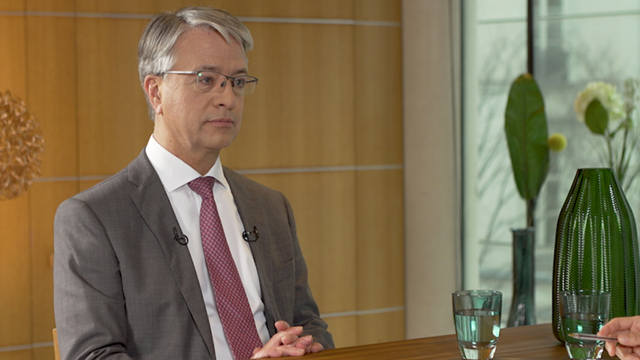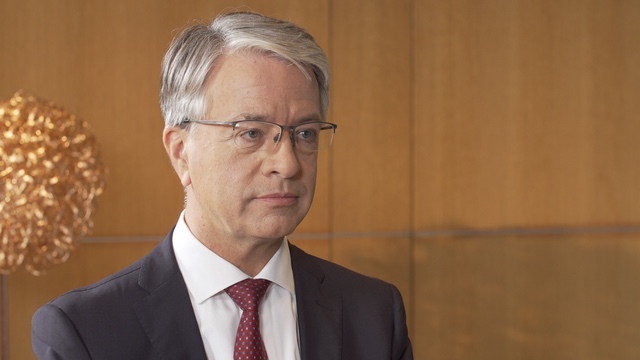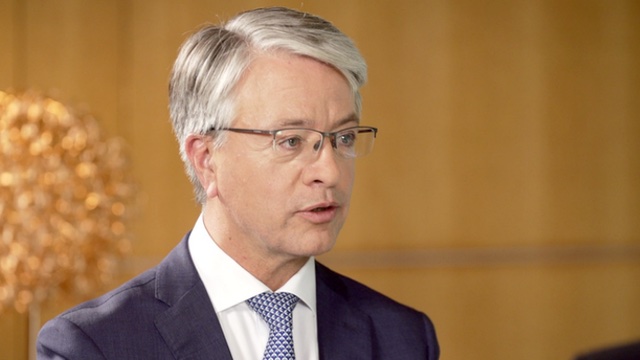EuroBusiness Media (EBM): BNP Paribas, one of Europe’s largest banks, reports results for the third quarter. Baudouin Prot welcome, you are the CEO of BNP Paribas. What are your comments on the Group's performance in the third quarter?
Baudouin Prot: The Group performed well this quarter, despite the impact of an additional impairment on Greek debt, and a very challenging environment for both CIB activities and asset management activities. Revenues exceeded 10 billion euros with costs remaining under control, while the cost of risk, excluding exceptional items, continued to decline significantly on the previous year. However, following the new agreement on Greek debt of 27 October, we increased the impairment on our Greek exposure with a pre-tax impact of 2.3 billion euros. The Group’s net income thus stands at 541 million euros. However, it is close to 2 billion euros excluding the additional impairment on Greek debt. Net income for the nine months comes to 5.3 billion euros which equates to a still competitive double digit annualised ROE of 10.2%. BNP Paribas has continued to create value for all its stakeholders, as shown by the additional increase in the book value per share to 57.4 euros.
EBM: In view of the recent agreement to haircut Greek debt by as much as 50%, have you taken additional provisions on Greece this quarter? If so, to what extent? And what is your perception of the contagion risk to other peripheral countries, such as Italy, Portugal, Spain or Ireland?
Baudouin Prot: Yes, as I mentioned, we have increased our provision on total Greek exposure to 60% in the third quarter. This leaves us with a residual net exposure of 1.6 billion euros. In addition, the exposure of insurance activities has been impaired accordingly. The recent Euro Summit took decisive steps to reduce market uncertainty by addressing a number of critical issues. This included the review of the programme for Greece for both the official sector and for private creditors and the sizeable strengthening of the EFSF rescue fund to 1 trillion euros. All this should technically reduce the contagion risk for other peripheral countries; however, the possibility of a referendum in Greece on the bailout programme is adding once again a significant element of uncertainty.
EBM: You have announced an ambitious deleveraging plan leading to a 100 basis point increase in your Common Equity Tier 1 ratio by the end of 2012, that is equivalent to a 70 billion euro RWA reduction. What will be the impact of this plan on your revenues and results?
Baudouin Prot: We are proceeding swiftly with the implementation of our deleveraging plan. As you just mentioned, we are targeting a 100 basis point improvement in our Tier 1 ratio by the end of 2012. We have identified projects and initiatives equivalent to about 80% of the plan that we are already implementing. When these are finalized, we anticipate a reduction in terms of recurrent gross operating income in the region of 750 million euros after the positive effects of asset repricing and cost reduction. In addition, we estimate one-off restructuring costs of 400 million euros and losses on asset disposals in the region of 800 million euros. Reducing our US dollar funding needs is a key component of the plan, targeting a 60 billion dollar reduction by year-end 2012. This quarter we have achieved a 20 billion dollar reduction and we expect an additional 20 billion dollar reduction in the fourth quarter. This means that by year-end we will have already achieved two thirds of our overall target.
EBM: Your CDS spread became more tense these past few weeks. Should we expect a hike in your funding costs, and if so, in what order of magnitude?
Baudouin Prot: Indeed our CDS spread has widened since August alongside European sovereign debt worries. Nevertheless, CDS spreads are more reflective of market fears than funding costs. Thanks to our very diversified funding sources and despite the temporary closing of public unsecured bond markets, BNP Paribas has been successfull in raising an additional 8 billion euros of medium and long term resources over the past 3 months through private placements and network distribution. The average maturity exceeded 5 years while the average cost was 89 basis points over swap, a limited increase compared to the cost of our first half funding. On top of the 8 billion euros already raised, we estimate an additional funding need of 20 billion euros for our 2012 medium and long term funding programme.
EBM: Recent turmoil in financial markets has penalised asset gathering businesses causing significant outflows. How have you performed in this environment and what changes, if any, do you expect to make to your existing structure?
Baudouin Prot: Clients’ risk aversion has undoubtedly impacted the asset gathering businesses but to different extents. While asset management has shown outflows in all asset classes, private banking and insurance in particular have seen inflows in the domestic markets and in Asia. We have posted a growth in revenues for Investment Solutions in the third quarter despite the difficult context and a lower contribution from asset management. Our asset management business will continue to reap the benefits of the Fortis integration plan synergies. Moreover, in view of this challenging environment, we are currently assessing possible solutions to further optimise the platform.
EBM: You have reaffirmed that you have enough capital. The EBA re-run of the stress tests showed that you would have a 2.1 billion euro capital shortfall to reach the 9% target by June 2012. Does this mean that you could be in a situation to have to increase your capital base in order to shore up your capital buffer?
Baudouin Prot: Our Common Equity Tier 1 ratio stood at 9.6% at the end of September. The EBA exercise showed a shortfall for BNP Paribas because it only takes into account two negative impacts: the impact resulting from the implementation of Basel 2.5 of -60 basis points, and the impact of the mark-to-market of the European sovereign exposure in advance on the Basel 3 timetable of -40 basis points. On the other hand, over the time horizon to the end of June 2012, we expect significant benefits accruing from the deleveraging plan we are implementing and from retained earnings over the next three quarters. Hence, simply adding the sole benefit of half the deleveraging plan, of +50 basis points, we expect to reach a Common Equity Tier 1 ratio of 9.1% by June 2012 before even considering earnings generated over the period. I think this clearly shows that BNP Paribas will be able to meet the EBA target without tapping the market.
EBM: Regarding retail activities in your domestic markets, how have they been affected by recent developments, especially with regard to deposit taking? Are you experiencing higher funding costs?
Baudouin Prot: Retail activities in our domestic markets have progressed very well this quarter. Business volumes in our four domestic markets - France, Italy, Belgium and Luxembourg - were sustained. In the third quarter, deposit and loan growth was quite well balanced, with both growing in the region of 6%. On the loan side, we continued to actively finance customers’ projects in our domestic markets, launching specific actions for SMEs and entrepreneurs. We also continued to support households’ demand for mortgages which, although still dynamic, was somewhat lower than in previous quarters. Deposit growth in France and BeLux remains very healthy with an increase above 7% in the third quarter. This growth was driven by demand deposits as well as by saving accounts. In the current market and regulatory environment, the preference of both clients and banks has been skewed towards on-balance sheet products rather than off-balance sheet. While in Italy BNL showed a slight reduction in total deposits, essentially in line with the market. This good deposit gathering trend did not hamper profitability. Cost of risk remained at a very low level in France and Belux, while stabilising at BNL and continuing to decrease at BancWest and Personal Finance. All retail divisions achieved double digit pre-tax income in the quarter, leading Retail Banking as a whole to post a 23% growth in the pre-tax result.
EBM: Regarding your CIB franchise, many European banks have warned that capital markets businesses, notably fixed income, will generate less revenue than anticipated. Do you agree with this forecast and what has been BNP Paribas’ performance in the last quarter?
Baudouin Prot: In line with what has already been disclosed by our European peers, our CIB activities over the quarter have obviously suffered from the market turmoil which resulted in a drop in Capital Market revenues. In our Fixed Income, uncertainty surrounding European Sovereign debt increased volatility and sharply reduced liquidity on credit and rates, resulting in a significant decrease in revenues by 33%, excluding the cost of reducing sovereign debt exposure. However, even in these difficult market conditions, BNP Paribas succeeded in maintaining a good level of activity on Corporate Bond issues, and kept its global number 1 ranking in covered bond issues, which has been the main access for European Banks to Capital Markets in the last quarter. Hence, while Fixed Income revenues are under pressure in this environment, we are also confident that, given the intrinsic strengths of our Fixed Income platform, BNP Paribas is well positioned to benefit from the expected disintermediation resulting from the implementation of Basel 3 regulations, keeping its leading DCM position in Euro.
EBM: Personal finance activities are being penalised by more stringent requirements in terms of liquidity and new regulations on consumer finance. What future do you see for this business?
Baudouin Prot: In the changing environment you have just mentioned, Personal Finance is already proceeding in the right direction. More stringent liquidity constraints led to the downsizing of specialised mortgage business in selected countries while the Group is refocusing domestic markets’ mortgage activity onto retail networks. In addition, new European regulations aiming to contain households’ over-indebtedness, will lead to lower volumes of activity. This will weigh on revenues but, on the other hand, it will also result in a lower cost of risk. I am therefore convinced that Personal Finance will remain an important contributor to the Group’s profits in the future.
EBM: Baudouin Prot, CEO of BNP Paribas, thank you very much!
Baudouin Prot: You’re welcome!






